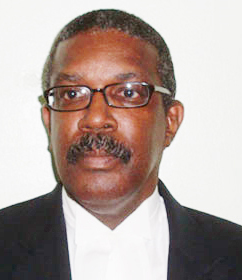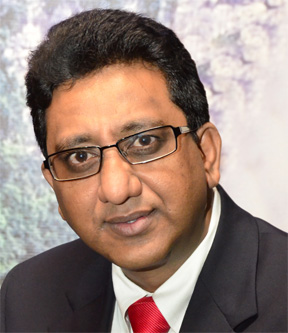Saying government’s failure to reconstitute the Judicial Service Commission (JSC) for over a year is part of an attempt to undermine and erode the integrity of the body, attorney Anil Nandlall is calling for the public to speak out to protect it and other institutions from political abuse.
While there are mixed views in the legal community about the need for the JSC to be constituted in a timely manner, Nandlall, a former Attorney General, insists that the current state of affairs should be condemned by all.
In the absence of the JSC, magistrates cannot be appointed, while the consideration of new High Court and Appellate Court judges is in limbo. The law gives the commission the power to appoint magistrates, while it is also responsible for making recommendations as it pertains to judges, who are appointed by the President.

Nandlall told Sunday Stabroek that the JSC is one of those important independent constitutional bodies since its functions are integral to the democratic constitutional architecture of the country’s legal system. The same can be said of the Police Service Com-mission, the Public Service Commission and the Teaching Service Commission, he said, before adding that the “authoritarian tentacles of this administration has repeatedly been visible in attempting to undermine and erode both the integrity and the independence of these institutions.”
Nandlall, who has been very outspoken about the JSC, reminded that there have been several court rulings declaring attempts by ministers of the administration to give political directions to the commissions as unconstitutional.
According to him, another mechanism used by the administration to undermine the commissions is the “cyclical failure to swear in members in a timely fashion.” He said that it would appear that the President has arrogated unto himself a belief that he can “do so at his capricious whim and fancy.” This omission by the President, he said regularly leaves these tribunals non-functional.
“When these constitutional checks and balances are not functional, the way is paved for executive excesses and abuse,” Nandlall posited before noting that these atrocities do not attract condemnations from civil society. “Perhaps, it is because there is no civil society anymore… The sad truth is these are not political matters. These institutions exist for the protection of every citizen and for the public good. It is, therefore, the responsibility of every citizen to protect them from political abuse,” he stressed.
Some in the legal arena say that the delay in reconstituting the JSC is deliberate so as to pave the way for a possible shake up of the hierarchy of the judiciary.
The constitution provides for the establishment of a JSC, which is to comprise the Chancellor, who is the chairman, the Chief Justice, the Chairman of the Public Service Com-mission and such other members appointed in accordance with provisions listed in Section 2 of the relevant Article.
Minister of State Joseph Harmon in late September said that the reconstitution of the JSC was “receiving active consideration,” when asked whether the issue has been discussed at Cabinet.
Harmon pointed out that only recently some persons who will serve on the Commission were appointed, including the Chairman of the Public Service Commission. He suggested that the JSC would be in place “very shortly.” How-ever, there has been no indication since then of any movement in this regard.
According to Article 199 of the constitution, the JSC has the power to make appointments of judicial and legal officers and to remove and to exercise disciplinary control over persons holding or acting in such offices. Such persons include the office of the Commissioner of Title, Magistrates, the Director of Public Prosecutions, the Deputy Director of Public Prosecutions, the Registrar of the High Court, the Deputy Registrar of the High Court, the Registrar of Deeds, the Deputy Registrar of Deeds and such offices connected with the courts of Guyana, and appointments for which legal qualifications are required, as may be prescribed by Parliament.
The JSC also plays a critical role in the selection of judges.
Article 128(2) provides that “the President shall act in accordance with the advice of the Judicial Service Commission and appoint a person to act in the office of Justice of Appeal or Puisne Judge, as the case may be.”
Uncertainty
One legal source is of the opinion that the uncertainty surrounding the nomination of Justice Kenneth Benjamin to be the Chancellor of the Judiciary is the reason behind the delay in reactivating the JSC. It was pointed out that there is some belief that given Benjamin’s advanced age as well as his track record as the Chief Justice of Belize, a position he currently holds, he may be inclined to return to Guyana, even if it means having to serve in an “acting” capacity.
If Benjamin returns and is appointed Chancellor, the present acting Chancellor Yonette Cummings-Edwards will become the acting Chief Justice, while Justice Roxane George, who occupies that position currently, will become an ordinary Supreme Court Judge.
The substantive appointments require the president and the opposition leader to agree on the appointment of persons to these two positions.
In February, opposition leader Bharrat Jagdeo informed the Head of State by way of a letter that after undertaking the requisite due diligence, he could not support either of the two being appointed. He did not offer any reasons.
Since then, the two have been at loggerheads, with each maintaining their respective positions, while Justice Benjamin has declined to say whether he is still interested in the position.
“It makes little sense then to go ahead with the JSC,” the source explained.
According to the source, not having a properly constituted JSC is of little consequence at the moment. It was explained the commission paid very little attention to matters under its mandate, particularly discipline.
The source noted that a judicial officer was taken before the commission for unprofessional conduct. The source said that a serious allegation was made and instead of instituting harsh punishment, the official was transferred from one court to another.
Other legal minds also expressed views that the work of the previous commissions were not transparent and they had made little attempts to ensure the judiciary maintained a high level of discipline.
Some, however, favour the reconstitution of the commission, while noting that if Justice Benjamin is appointed, he will be sworn in as a member of the commission and the work will go on.
In July, Nandlall, in a letter published in this newspaper, accused government of making no attempt to reconstitute the commission.
“Since, this Administration assumed the reins of executive government, it has been in constant confrontation or at a minimum, uneasy peace with the Judicial Service Commission. I have written several articles detailing the Attorney General’s public refusal to recognise the JSC’s constitutional power to appoint certain officers within the Deeds and Commercial Registry Authority and his refusal to allow those officers to discharge their functional responsibilities,” he wrote.
Nandlall also reminded that he had written several articles highlighting the President’s failure to act, for nearly a year, upon recommendations made by the then JSC to elevate certain puisne Judges to the Court of Appeal and to elevate and to appoint persons as High Court Judges and Commissioners of Title.
“The shocking response of the Government to my criticisms was that the Constitution does not stipulate any time period for the President to act upon these recommendations. Those who truly understand the language and spirit of the Constitution and the law would tell you that the President is expected to act in those circumstances with every convenient speed. Many have drawn the reasonable inference that the presidential delay was deliberate and intended to await the retirement of certain members of the then JSC,” he had pointed out.






